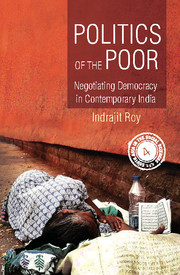Book contents
- Frontmatter
- Contents
- List of Tables, Map and Charts
- Acknowledgements
- Glossary
- Acronyms
- Introduction: Against False Binaries
- 1 The Perspectives of the Study: Towards an Agonistics of Democracy
- 2 Political Spaces: Institutional Opportunity Structures
- 3 Political Spaces: Social Relations of Power
- 4 From Clientelism to Citizenship?: The Politics of Supplications
- 5 From Moral Vocabularies to Languages of Stateness?: The Politics of Demands
- 6 From Backwardness to Improvement?: The Politics of Disputation
- 7 From Tradition to Modernity?: The Politics of Imagination
- Conclusion: The Politics of the Poor: Agonistic Negotiations with Democracy
- Annexure 1 The Dramatis Personae, 2009–10
- Annexure 2 The Census Survey
- Annexure 3 The Multidimensional Poverty Index
- Annexure 4 Schedule for BPL Census 2002
- Annexure 5 Schedule for BPL Census 2002 West Bengal
- Annexure 6 BPL Cutoff List for West Bengal
- Bibliography
- Index
3 - Political Spaces: Social Relations of Power
Published online by Cambridge University Press: 03 August 2019
- Frontmatter
- Contents
- List of Tables, Map and Charts
- Acknowledgements
- Glossary
- Acronyms
- Introduction: Against False Binaries
- 1 The Perspectives of the Study: Towards an Agonistics of Democracy
- 2 Political Spaces: Institutional Opportunity Structures
- 3 Political Spaces: Social Relations of Power
- 4 From Clientelism to Citizenship?: The Politics of Supplications
- 5 From Moral Vocabularies to Languages of Stateness?: The Politics of Demands
- 6 From Backwardness to Improvement?: The Politics of Disputation
- 7 From Tradition to Modernity?: The Politics of Imagination
- Conclusion: The Politics of the Poor: Agonistic Negotiations with Democracy
- Annexure 1 The Dramatis Personae, 2009–10
- Annexure 2 The Census Survey
- Annexure 3 The Multidimensional Poverty Index
- Annexure 4 Schedule for BPL Census 2002
- Annexure 5 Schedule for BPL Census 2002 West Bengal
- Annexure 6 BPL Cutoff List for West Bengal
- Bibliography
- Index
Summary
…the caste system is not merely a division of labour. It is also a division of labourers.
Ambedkar, 1936Caste is congealed class.
Ram Manohar Lohia, 1964India's poor are integral, not marginal, to its postcolonial democracy and emerging market economy. Their participation in the political and economic life of the country is mediated through the social relations of power in which they are enmeshed. Social relations of power shape the ways in which political parties seek legitimation from them during and after elections, employers recruit their labour for purposes of production and mercantile and commercial actors interact with them in market places. Such relations are constituted by the intersecting collaborations and conflicts between different social classes, of which the labouring poor are but one. This chapter introduces the four political places in which fieldwork was conducted. It does so through a discussion of the social relations of power – the web of collaborations and conflicts – within which the people of the localities are embedded. Because any discussion of social relations of power must necessarily be grounded in concrete realities, the material in this chapter underscores the detailed and the contingent unlike than the general and broad discussion of institutional opportunity structures of the previous chapter. Readers will meet the plethora of characters whose actions constitute the politics of the poor. I deploy a class-analytic framework to think through the social relations of power within which they are embedded. I first elaborate the key building blocks of class in the context of eastern India, highlighting the importance of labour relations and caste status in the constitution of class: three social classes are identified, based on a synthesis of the rich literature on the subject. I then introduce each of the four fieldwork localities by detailing the social relations of power that permeate their political economies. To understand the social relations of power, I direct specific attention to relations of production and the relations of distribution in the study localities. In the context of this chapter, the social relations of production refer to the ways in which members of the three identified social classes organize around their economic activities and deploy labour and material resources.
- Type
- Chapter
- Information
- Politics of the PoorNegotiating Democracy in Contemporary India, pp. 117 - 186Publisher: Cambridge University PressPrint publication year: 2017



